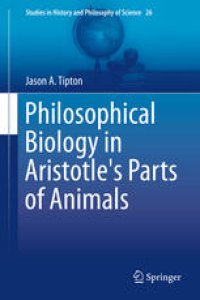
Ebook: Philosophical Biology in Aristotle's Parts of Animals
Author: Jason A. Tipton (auth.)
- Tags: History of Philosophy, Philosophy of Biology
- Series: Studies in History and Philosophy of Science 26
- Year: 2014
- Publisher: Springer International Publishing
- Edition: 1
- Language: English
- pdf
This book provides a detailed analysis of Aristotle’s Parts of Animals. It presents the wealth of information provided in the biological works of Aristotle and revisits the detailed natural history observations that inform, and in many ways penetrate, the philosophical argument. It raises the question of how easy it is to clearly distinguish between what some might describe as “merely” biological and the philosophical. It explores the notion and consequences of describing the activity in which Aristotle is engaged as philosophical biology. The book examines such questions as: do readers of Aristotle have in mind organisms like Ascidians or Holothurians when trying to understand Aristotle’s argument regarding plant-like animals? Do they need the phenomena in front of them to understand the terms of the philosophical argument in a richer way? The discussion of plant-like animals is important in Aristotle because of the question about the continuum between plant and animal life. Where does Aristotle draw the line? Plant-like animals bring this question into focus and demonstrate the indeterminacy of any potential solution to the division. This analysis of Parts of Animals shows that the study of the nature of the organic world was Aristotle’s way into such ontological problems as the relationship between matter and form, or form and function, or the heterogeneity of the many different kinds of being.
This book provides a detailed analysis of Aristotle's Parts of Animals. It takes its bearings from the detailed natural history observations that inform, and in many ways penetrate, the philosophical argument. This analysis raises the question of how easy it is to clearly disentangle what some might describe as the "merely" biological from the philosophical. This book explores the notion and consequences of describing the activity in which Aristotle is engaged as philosophical biology. Do readers of Aristotle have in mind organisms like sea squirts (ascidians) or sea cucumbers (holuthurians) when trying to understand Aristotle's argument regarding plant-like animals? Do we need the phenomena in front of us to understand the terms of the philosophical argument in a richer way? The discussion of plant-like animals is important to Aristotle because of the apparent continuum between plant and animal life. Where does Aristotle draw the line? Plant-like animals bring this question into focus and demonstrate the indeterminacy of any potential solution to the division. This analysis of the Parts of Animals shows that the study of the nature of the organic world was Aristotle's way into such ontological problems as the relationship between matter and form, the interplay between form and function, and the heterogeneity of the many different kinds of being.